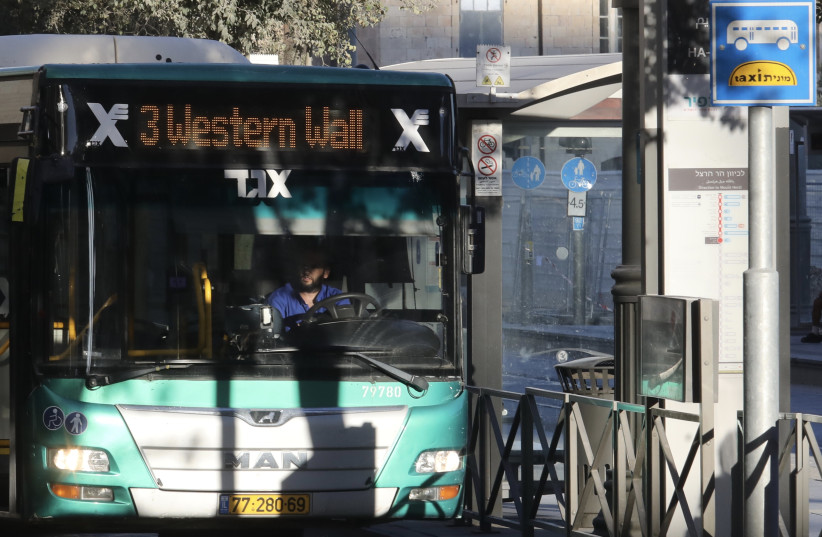
WHILE RUNNERS in the annual Jerusalem Marathon are cheered by spectators along the route – and more than 4,000 runners participated this year, including many from some 80 countries who came to Israel despite the war and the bad press that Israel is receiving – it’s time for organizers to reduce the inconvenience to residents of the city.
By 11 o’clock on Friday morning, not a single runner could be seen along the streets of Keren Hayesod and King George or some of the other main arteries.
Yet buses did not start running until 1 p.m., and even later on some routes.
However, cars, bikes, and scooters were traversing those streets and adjacent side streets as early as 10:30 a.m.
At around noon, large clusters of people were gathered at bus stops, but there were no buses. At close to 1 p.m., the sight of an Egged bus gave false hope. It was empty of passengers and didn’t stop: obviously “not in service.”

Yeshiva students and English-speaking girls from seminaries could be seen wheeling suitcases to the places where they would be staying over Shabbat.
Elderly people walking slowly with the aid of canes or shopping trolleys were laboriously wending their way to or from the Mahaneh Yehuda market.
Many shops were closed, with proprietors anticipating very few, if any, customers.
Indeed, the sparse coffee shop clientele proved them right. Last year, coffee shops throughout the inner city were doing a roaring trade, and at some of the more popular venues people had to wait in line for a vacant table.
There were many vacant tables this year, and far fewer people downtown. The large contingents of Border Police were superfluous.
Perhaps Transportation Minister Miri Regev and Mayor Moshe Lion could put their heads together with a view to making more places accessible to people who are not running in the marathon and who have no real interest in it.
Complex life interests
■ NO ONE has just one interest in life. We are all complex characters whose attentions focus on a number of sometimes disparate subjects. For instance, a neurosurgeon may also be a long-distance runner, as is the case with Dr. Leah Kahanov, a senior neurosurgeon at Hadassah Medical Center who competed in last Friday’s marathon.
In recent months, together with members of her department, she operated on soldiers wounded in Gaza and treated them for weeks in the intensive care unit.
Between complex surgeries, she managed to find time to go for long runs, which she says strengthens both her body and her mind.
Yet even while running, she could not stop thinking about her patients. “There are no more exciting moments than meeting our soldiers after many weeks when they are already beginning rehabilitation and their cognitive abilities are improving, proving that overcoming even the most complicated and difficult situations is possible.”
Even though the needs of her patients are seldom far from her thoughts, they are not always in the forefront of her mind.
Running provides a certain release for her.
“Running allows one to forget, releases thoughts and all the daily tensions. I await these moments of clearing my head while running alone in nature,” says Kahanov, who requires the highest level of concentration in the operating room, where life-saving work is conducted around the clock. Since Oct. 7, her department has been at peak activity as part of Hadassah’s extensive mobilization in treating the war wounded.
During that period, more than 550 civilians, soldiers, and members of the security forces were treated at Hadassah, she says, adding that several soldiers sustained severe wounds that required neurosurgery.
“As a team, we were part of the full mobilization of the hospitals in Ein Kerem and Mount Scopus, with some working around the clock, and some being drafted into reserve duty. It was clear from the outset that this was an incident of magnitude we had not previously experienced, despite Hadassah’s vast experience in treating victims of terrorist attacks,” she said.
“On the very first day of the war, a female soldier who had been critically wounded by gunfire to the head at a base in the South was taken to Hadassah,” the neurosurgeon said. “We fought tooth and nail for her. At first, she was on a ventilator and was anesthetized because of the severity of her injury. Later, when the situation permitted, she underwent advanced surgeries and treatments by the team led by Prof. Guy Rosenthal and Dr. Samuel Moscovici.
“Today, she is in rehabilitation, where she is working hard at improvement. After her, we treated more and more soldiers who were evacuated by helicopter,” Kahanov said.
“It takes a lot of patience to see results. Like a marathon, our patients also run long distances.”
Marks & Spencer and Israel
■ FOR MANY years, Israelis traveling to the UK for business, study, or vacation headed to the nearest M&S store. Marks & Spencer sold quality merchandise, including those with Israeli labels such as Bagir and Polgat, at affordable prices. In fact, they cost less at M&S than they did at home.
Members of the Marks family and the Sieff family, into which Rebecca Marks married, have played an extraordinary role in the founding and development of Israel and of global Jewish organizations. Rebecca Sieff (nee Marks) was one of the co-founders of WIZO (the Women’s International Zionist Organization) which, among its many and varied projects, runs a battered women’s shelter in Jerusalem. The Marks and Sieff families also established the Weizmann Institute; and it was Marks & Spencer that primarily enabled “Made in Israel” goods to reach the British market.
What is less known is the part played by Marks & Spencer in the rescue of European Jews prior to WW II. On Tuesday evening, March 19, Laurence Becker will speak on the subject at a meeting of the Israel branch of The Jewish Historical Society of England at Hibba Center, 75 Herzog Boulevard.
greerfc@gmail.com
